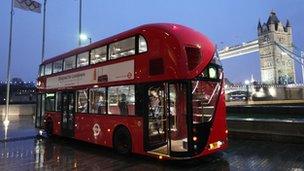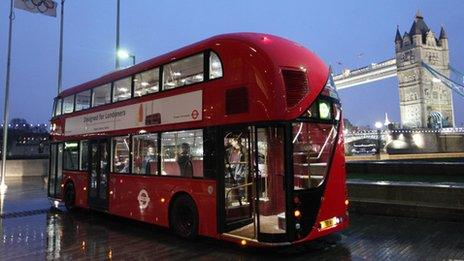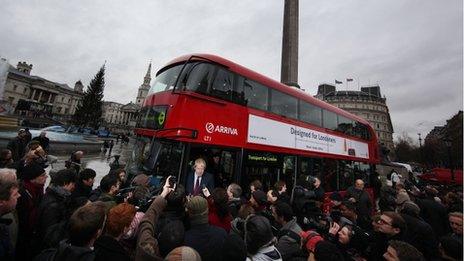The true cost of London's new bus discovered
- Published
The ball-park figure for 600 buses will be around £180m of tax-payers' money
Buried in the latest Transport for London board papers is the true cost of the new bus for London, external.
The plan had been for bus operators to buy them, but now it seems Transport for London (TfL) is forking out.
The reason for that seems to be there is "currently no market" at the moment for the buses outside London and so there will have been little appetite for bus operators to buy them.
The ball-park figure for 600 buses will be around £180m of tax-payers' money with about another £40m on top of that annually for the conductors' wages.
Critics say that is too much and the money could have been better spent updating the bus fleet.
The Mayor's supporters will no doubt say he has again delivered.
Leon Daniels, TfL's managing director of surface transport, said: "The buses will be purchased by TfL.
"We believe TfL can secure a better unit price by purchasing in larger numbers - rather than a bus operator ordering in smaller numbers on a per route basis."
The buses will then be leased to the bus operators for a notional fee.
This model of operation will offer a number of advantages.
'Madness'
Firstly it will reduce route contract costs - because the operator will have to quote for just staffing, fuel and maintenance - and not vehicle costs.

The ball-park figure for 600 buses will be around £180m of tax-payers' money
Secondly, TfL will be able to move the buses between operators when route contracts change and extend the operational life of the vehicle.
"After the initial purchase outlay we are confident that this ownership model will actually deliver savings of tens of millions of pounds over the life of the buses."
Of course, crucially, we don't know those savings yet and so we don't know the benefit.
London Assembly Green Party member Darren Johnson said: "The mayor has called the new bus for London a world class piece of technology, but the problem is that no one outside of London is going to buy it.
"If Transport for London go ahead with this madness, then fares will have to rise to pay for the new bus for London and investment will have to be cut in other projects."
Long term savings?
There is no doubt the Mayor has delivered some new projects and he has done it in pretty much the same way.
The new bus funding follows the same ethos.
It's not free-market. In fact it uses front-loaded public money as 'seed' money and then it is hoped the benefits are accrued over many years through sponsorship or savings.
I'm thinking the TubeLines takeover to smooth the Jubilee line upgrade, the cable car and the bike hire scheme.
Usually the initial claims are nearly always, it seems, discarded as reality dawns.
So claims that no public money would used on the cable car bit the dust as did these plans for bus operators to buy all the new buses.
What it also usually means is tax-payers' money is used to attract private money - as was the case for the cable car and bike hire schemes.
Or tax-payers' money is used to deliver claims of savings down the line - the case for TubeLines and the new bus.
What is clear is that without the public money many of these schemes would struggle to get off the ground.
Let me know what you think about the new bus and if it's worth the money.
- Published19 December 2011

- Published27 February 2012
- Published16 December 2011
